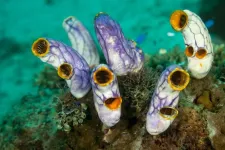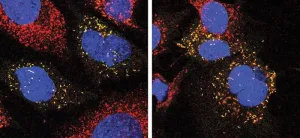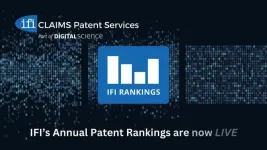(Press-News.org) HOUSTON ― A vaccine showed potential to prevent relapse of KRAS-mutated pancreatic and colorectal cancers for patients who had previously undergone surgery, according to a Phase I trial led by researchers at The University of Texas MD Anderson Cancer Center. Results were published today in Nature Medicine.
In the trial, patients with pancreatic and colorectal cancer who were considered at high risk of relapse received a maximum of 10 doses of the ELI-002 vaccine targeted toward KRAS G12D and G12R mutations. T cell responses were seen in 84% of all patients and in 100% of those in the two highest dose cohorts, including those who received the recommended Phase II dose of 10 mg.
T cell responses were predictive of reductions in tumor biomarkers and ctDNA clearance, and they correlated with an 86% reduction in risk of relapse or death. For patients above the median T cell response level, median recurrence-free survival had not yet been reached, compared to 4.01 months in the group with a T cell response level below the median. This was a statistically significant improvement.
“Patients who have undergone surgery for pancreatic cancer are still at risk for relapse of the disease, even after they finish chemotherapy. This is especially true for patients who are positive for circulating tumor DNA (ctDNA), which puts them at a higher risk for relapse,” said principal investigator Shubham Pant, M.D., associate professor of Gastrointestinal Medical Oncology. “When these patients do relapse, the disease is not curable, so this is certainly an area of unmet need.”
The multicenter AMPLIFY-201 trial is evaluating ELI-002, a lymph node-targeted cancer vaccine designed to lower the likelihood of these relapses by ‘training’ T cells to recognize KRAS mutations, allowing them to identify and eliminate KRAS-mutant cells. ELI-002 also is an off-the-shelf vaccine, meaning it does not have to be specially formulated to each individual. KRAS-mutated cancers make up about a quarter of all solid tumors, including 90% of pancreatic cancer patients, who most commonly have the G12D mutation.
No patients experienced dose-limiting toxicities, cytokine release syndrome or any treatment-emergent adverse events of any kind above Grade 3. The most common adverse events of any grade were fatigue (24%), injection site reaction (16%) and myalgia (12%).
Twenty-five patients participated in the trial, with a median age of 61. Of these, 84% were white, 8% were Asian and two patients were of an unreported ethnicity. Patients were 60% female. All 25 previously had surgery or another procedure designed to be curative, and seven previously had received radiation therapy.
“It’s early, but we saw some promising results that this vaccine may help many of these patients avoid relapse, which could increase survival,” Pant said. “It also showed a favorable safety profile, which is exciting.”
Results from this trial have led to a Phase II trial that will begin later this year, with a new formulation of ELI-002 targeting additional KRAS mutations. Preliminary data from this trial was presented in 2023 at the American Society of Clinical Oncology (ASCO) Annual Meeting and at the American Association for Cancer Research (AACR) Special Conference on Pancreatic Cancer.
This trial was supported by Elicio Therapeutics. A full list of authors and their disclosures can be found here.
END
Vaccine demonstrates potential in delaying relapse of KRAS-mutated pancreatic and colorectal cancers
All patients receiving highest dose had significant T cell responses that correlated with significant reduction in risk of relapse
2024-01-09
ELSE PRESS RELEASES FROM THIS DATE:
Smart skin bacteria are able to secrete and produce molecules to treat acne
2024-01-09
International research led by the Translational Synthetic Biology Laboratory of the Department of Medicine and Life Sciences (MELIS) at Pompeu Fabra University has succeeded in efficiently engineering Cutibacterium acnes -a type of skin bacterium- to produce and secrete a therapeutic molecule suitable for treating acne symptoms. The engineered bacterium has been validated in skin cell lines and its delivery has been validated in mice. This finding opens the door to broadening the way for engineering non-tractable bacteria to address skin alterations and other diseases using living therapeutics.
The research team is completed by scientists from the Bellvitge Biomedical Research ...
Stranger than friction: A force initiating life
2024-01-09
As the potter works the spinning wheel, the friction between their hands and the soft clay helps them shape it into all kinds of forms and creations. In a fascinating parallel, sea squirt oocytes (immature egg cells) harness friction within various compartments in their interior to undergo developmental changes after conception. A study from the Heisenberg group at the Institute of Science and Technology Austria (ISTA), published in Nature Physics, now describes how this works.
The sea is full of fascinating life forms. From algae and colorful fish to marine snails and sea squirts, a completely different world reveals itself underwater. Sea squirts or ascidians in particular are very unusual: ...
Different biological variants discovered in Alzheimer's disease
2024-01-09
Dutch scientists have discovered five biological variants of Alzheimer's disease, which may require different treatment. As a result, previously tested drugs may incorrectly appear to be ineffective or only minimally effective. This is the conclusion of researcher Betty Tijms and colleagues from Alzheimer Center Amsterdam, Amsterdam UMC and Maastricht University. The research results will be published on 9 January in Nature Aging.
In those with Alzheimer's disease, the amyloid and tau protein clump in the brain. In addition to these clumps, other biological processes such as inflammation and nerve ...
Alzheimer Europe adopts position on anti-amyloid therapies for Alzheimer’s disease, issuing a call to action for timely, safe and equitable access
2024-01-09
Luxembourg, 9 January 2024 – In a new position paper, and following engagement with its national members and the European Working Group of People with Dementia (EWGPWD), Alzheimer Europe calls for concrete actions to enable timely, safe and equitable access to anti-amyloid drugs, for patients who are most likely to benefit from these innovative new treatments for Alzheimer’s disease (AD).
The growing prevalence and impact of AD has catalysed huge investments in research on its causes, diagnosis, treatment and care. After many high-profile ...
Improved cellular recycling could benefit patients with neurodegenerative conditions
2024-01-09
For the first time, a research team at The Hospital for Sick Children (SickKids) has uncovered a way to potentially reduce the amount of toxic cellular waste accumulating in patients with Zellweger Spectrum Disorder (ZSD).
ZSD is a group of rare, neurodegenerative genetic conditions caused by genetic variations that reduce the number of peroxisomes – the parts of cells that are responsible for, among other tasks, breaking down fats. ZSD varies in severity and is characterized by progressive neurodegeneration as well as symptoms that range from visual impairments, such as cataracts, to liver and kidney disfunction.
Like all living ...
Green ammonia could decarbonize 60% of global shipping when offered at just 10 regional fuel ports
2024-01-09
A study published today in IOP Publishing’s journal Environmental Research: Infrastructure and Sustainability has found that green ammonia could be used to fulfil the fuel demands of over 60% of global shipping by targeting just the top 10 regional fuel ports. Researchers at the University of Oxford looked at the production costs of ammonia which are similar to very low sulphur fuels, and concluded that the fuel could be a viable option to help decarbonise international shipping by 2050.
Around USD 2 trillion will be needed to transition to a green ammonia fuel supply chain by 2050, primarily to finance ...
Samsung leads again in U.S. patents while Qualcomm leaps into second place; overall grants dip 3.4%
2024-01-09
New Haven, Conn., Jan. 9, 2024—U.S. patent grants declined 3.4% from 2022, the lowest level since 2019, and Samsung held onto the top spot for the second year in a row according to IFI CLAIMS Patent Services, world leader in tracking patent application and grant data.
IFI CLAIMS Patent Services is a Digital Science company that compiles and tracks data from the U.S. Patent and Trademark Office (USPTO) and other patent-issuing agencies around the globe. IFI translates its world-leading data into an annual U.S. Top 50 and IFI Global 250 patent rankings, providing valuable insights into companies’ R&D activity.
Other findings in IFI’s latest rankings include patent powerhouse ...
Severe MS predicted using machine learning
2024-01-09
A combination of only 11 proteins can predict long-term disability outcomes in multiple sclerosis (MS) for different individuals. The identified proteins could be used to tailor treatments to the individual based on the expected severity of the disease. The study, led by researchers at Linköping University in Sweden, has been published in the journal Nature Communications.
“A combination of 11 proteins predicted both short and long-term disease activity and disability outcomes. We also concluded that it’s important to measure ...
Combining anti-tumor drugs with chemo may improve rare children’s cancer outcomes
2024-01-09
Children who develop neuroblastomas, a rare form of cancer which develops in nerve cells, may benefit from receiving certain anti-tumour drugs as well as chemotherapy, a new trial has found.
The results of the BEACON trial conducted by the Cancer Research UK Clinical Trials Unit at the University of Birmingham found that combining anti-angiogenic drugs, which block tumours from forming blood vessels, alongside various chemotherapy drugs led to more young people seeing their tumours shrinking, from 18% in the control group to 26% among those on Bevacizumab.
The findings are published in the Journal of Clinical Oncology today. The trial saw 160 young ...
EBRAINS research infrastructure secures €38 million in funding for new phase of digital neuroscience
2024-01-09
The European Commission has accepted the EBRAINS 2.0 proposal submitted in response to the INFRASERV call, granting €38 million for the further development of services of the EBRAINS research infrastructure.
The European Commission has signed a grant agreement to fund EBRAINS with €38 million until 2026. Over the next three years, the infrastructure will continue to develop tools and services to widely serve research communities in neurosciences, brain medicine, and brain-inspired technologies.
EBRAINS (European Brain Research Infrastructures) is an EU co-funded collaborative research platform designed to advance neuroscience and brain ...
LAST 30 PRESS RELEASES:
Scientists show how to predict world’s deadly scorpion hotspots
ASU researchers to lead AAAS panel on water insecurity in the United States
ASU professor Anne Stone to present at AAAS Conference in Phoenix on ancient origins of modern disease
Proposals for exploring viruses and skin as the next experimental quantum frontiers share US$30,000 science award
ASU researchers showcase scalable tech solutions for older adults living alone with cognitive decline at AAAS 2026
Scientists identify smooth regional trends in fruit fly survival strategies
Antipathy toward snakes? Your parents likely talked you into that at an early age
Sylvester Cancer Tip Sheet for Feb. 2026
Online exposure to medical misinformation concentrated among older adults
Telehealth improves access to genetic services for adult survivors of childhood cancers
Outdated mortality benchmarks risk missing early signs of famine and delay recognizing mass starvation
Newly discovered bacterium converts carbon dioxide into chemicals using electricity
Flipping and reversing mini-proteins could improve disease treatment
Scientists reveal major hidden source of atmospheric nitrogen pollution in fragile lake basin
Biochar emerges as a powerful tool for soil carbon neutrality and climate mitigation
Tiny cell messengers show big promise for safer protein and gene delivery
AMS releases statement regarding the decision to rescind EPA’s 2009 Endangerment Finding
Parents’ alcohol and drug use influences their children’s consumption, research shows
Modular assembly of chiral nitrogen-bridged rings achieved by palladium-catalyzed diastereoselective and enantioselective cascade cyclization reactions
Promoting civic engagement
AMS Science Preview: Hurricane slowdown, school snow days
Deforestation in the Amazon raises the surface temperature by 3 °C during the dry season
Model more accurately maps the impact of frost on corn crops
How did humans develop sharp vision? Lab-grown retinas show likely answer
Sour grapes? Taste, experience of sour foods depends on individual consumer
At AAAS, professor Krystal Tsosie argues the future of science must be Indigenous-led
From the lab to the living room: Decoding Parkinson’s patients movements in the real world
Research advances in porous materials, as highlighted in the 2025 Nobel Prize in Chemistry
Sally C. Morton, executive vice president of ASU Knowledge Enterprise, presents a bold and practical framework for moving research from discovery to real-world impact
Biochemical parameters in patients with diabetic nephropathy versus individuals with diabetes alone, non-diabetic nephropathy, and healthy controls
[Press-News.org] Vaccine demonstrates potential in delaying relapse of KRAS-mutated pancreatic and colorectal cancersAll patients receiving highest dose had significant T cell responses that correlated with significant reduction in risk of relapse





